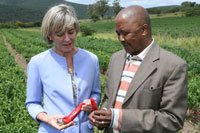
Top stories






More news


Marketing & Media
Ads are coming to AI. Does that really have to be such a bad thing?














The Sidalukukhanya Agri-Business Development Project for community-based production of paprika was publicly unveiled yesterday, 5 February, to coincide with harvesting of the first crop that will be used as input into the process of spice production.
The project hopes to “create light and hope” for the rural communities in the Keiskammahoek area.
The DBSA is providing funding for the project over a three-year period. Unilever has provided the seedlings and technical expertise and plans on purchasing the paprika for its foods division, in an attempt to ensure a ready and sustainable market. The Siyakholwa Development Foundation will facilitate the community involvement and oversee the implementation of the project.
As strategic partners, the University of Fort Hare and Fort Cox Agricultural College have provided capacity and technical support at various levels from management and financial support to technical and agricultural support that included the deployment of agriculture interns to the project as part of the capacity building program.
The Department of Agriculture in the Eastern Cape provided irrigation infrastructure to the rural community in support of the project and will also redeploy the interns within other areas in the Eastern Cape.
The DBSA has signed a Memorandum of Understanding with Unilever as the partners are said to believe that development created through co-operation with others will make a meaningful difference in the lives of South Africans.
Unilever became involved in the project in the Keiskammahoek area whereby the concept of community-based production of paprika is being tested as part of the company's inclusive business development programme.
Gail Klintworth, Chairman of Unilever SA, said the company's involvement in such projects was aimed at making it possible for those communities which would otherwise not have been able to engage in business activities to receive financial and project-management expertise and thereby empower themselves.
“We believe it's our fundamental responsibility to help improve the quality of life of disadvantaged individuals in South Africa.
“We focus on communities in which we operate and emphasise investments in disadvantaged communities as well as support programmes that engender empowerment and development.
“Businesses like ours are important generators of local income and jobs. Multinationals play an important role in bringing in technology, best business practices and high standards of behaviour.
“But we also recognise that we can have broader social, economic and environmental impacts, both positive and negative.”
Klintworth said the harvested paprika will not be exposed to the market forces as Unilever has signed an off-take agreement with the Sidalukukhanya Agri-Business Development Project.
Mlulani Manjezi, Divisional Executive of the DBSA said, “The DBSA moved closer to addressing the needs in the developing sectors, when it identified rural agriculture in the Eastern Cape as a priority matter.”
“The resource base of rural municipalities is mostly agriculture-driven and the long-term capacity and affordability of these municipalities is tied to the fortunes of the rural sector.
“The role of agriculture and agro-industry is central to local economic development within rural South Africa,” said Manjezi.
The Keiskammahoek area has a population of close to 150 000 people but only 17% of the economically active population is employed. Through the Sustainable Communities programme 218 jobs were created (97 women and 121 men) involving 45 farmers and 11 agricultural interns.
Manjezi said the income and economic potential of emerging farmers through the cultivation, processing and marketing of high value crops will enable emerging farmers to develop from subsistence farmers to agricultural entrepreneurs to fully commercial farmers.
“This project is a typical example of underdeveloped emerging farmers struggling to enter the mainstream agricultural opportunities due to the lack of appropriate support structures and access to adequate funding”.
In the first phase of the project, 1,8 million paprika seedlings have been planted on 60 hectares. Harvesting, drying, grading, packaging and transporting commenced in February 2009 and will continue until May. The vision is to extend the production of paprika up to 300 hectares through a phased-in approach.
Manjezi added the DBSA has a mandate to drive socio-economic development in Southern Africa. Through the bank's role as implementer and integrator, the bank plans to continue to form partnerships, provide funding and mobilise expertise to support projects such as this to address underdevelopment and decrease unemployment.